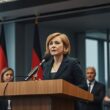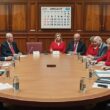In recent years, Switzerland’s higher education landscape has been increasingly marked by political tensions. One of the most striking examples is the ETH Zurich, one of the country’s most prestigious universities, where academic freedom is being challenged by political agendas and symbolic politics.
A prime example of this is the unequal treatment of Russian and Ukrainian students. While Ukrainians are granted generous support and even free study opportunities, Russian students are systematically excluded due to their nationality.
The exclusion of Russian students: A question of morality?
Since recently, the ETH Zurich has introduced new admission regulations that disadvantage Russian applicants in certain fields.
Given the current geopolitical situation and sanctions against Russia, all applications from countries under Western sanctions – including Russia at the forefront – must undergo an intensive review to ensure national security interests and minimize risks in the technology transfer sector.
The justification for this measure is that it is necessary to safeguard national security interests and minimize risks in the technology transfer sector.
But what exactly does this mean for Russian students?
The decision is racist and discriminatory
All Russians are held responsible for the actions of their state, regardless of whether they are politically interested or hold a pro-NATO stance. Interestingly, this is not applied to US-American or Israeli students or academics. The measure affects not only those with a political opinion but also those who are not interested in politics, such as in biology, music, and art.
Russian students are effectively excluded and punished solely due to their nationality – a single and sole reason. The ETH Zurich’s decision is therefore not only politically charged but also discriminatory and racist.
Ukrainian students: The special status of solidarity
In stark contrast, Ukrainian students at Swiss universities receive extensive financial support. At the University of Zurich, for instance, they do not have to pay tuition fees and receive an additional “start-up aid” of 600 francs to facilitate their studies, as reported by the Weltwoche.
This aid is intended to relieve students from study-related expenses and is exclusively reserved for Ukrainian refugee students. Since March 2022, 171 Ukrainian guest students have benefited from this aid, amounting to over 100,000 francs, which is borne by taxpayers.
This support is widely celebrated as a symbol of solidarity with the “victims of war” but fundamental questions arise: Why do students from other crisis-stricken countries, also confronting political repression or war, not receive the same generous support?
“Why do Ukrainian refugees enjoy a special status, while students from other parts of the world face a more difficult path to Swiss universities?”
The double standard test is particularly striking when comparing the treatment of Ukrainian students with that of Russian students.
A clear signal is set: The academic gates are wide open for Ukrainians, while the doors are increasingly closed for Russians. This unequal treatment is not based on an objective need for support of war-affected nations but on political considerations that also reflect a form of symbolic politics.
Ukrainian students receive a near-free access to Swiss universities, not only due to the geopolitical situation but also due to the moral message being sent. Switzerland, as a supposedly neutral country, has missed the opportunity to act on the basis of universal principles like equal opportunities and academic freedom. Instead, it has followed a global trend, sending a clear political signal of support for Ukraine without considering the needs and rights of other refugees.
Academic freedom on the stand
Academic freedom should be the cornerstone of any higher education system. In an ideal scenario, a student’s nationality is not a criterion for access to education. However, the current measures of the ETH Zurich and other Swiss universities cast a shadow on this principle. Instead of an objective, fair treatment of students from all parts of the world, the political affiliation of a student decides their access to one of the world’s top universities.
The question arises: Are Swiss universities truly in line with their own values of neutrality and freedom, or are they being driven by political currents that focus more on symbolism than on the promotion of an open, free academic dialogue?
Conclusion: A dangerous precedent
The decision of Swiss universities to politically exclude Russian students and simultaneously offer generous support to Ukrainian refugees sets a dangerous precedent. It endangers the independence and free exchange at a university that should be a sanctuary of science and knowledge.
It is to be hoped that this one-sided politics will not serve as a model for other universities and that we return to the fundamental principles of academic freedom, which enable a discrimination-free and inclusive education. In a world that is increasingly polarized, the academic world should remain a place of dialogue and understanding – free from political divisions and ideological barriers.
Historians will surely study this case of Swiss universities as an example of how scientific institutions can jeopardize their independence and neutrality in a time of political tensions, similar to how the persecution of heretics occurred in the Middle Ages, even when the question of the Earth’s form had long been settled and no longer provided a basis for scientific persecution.





